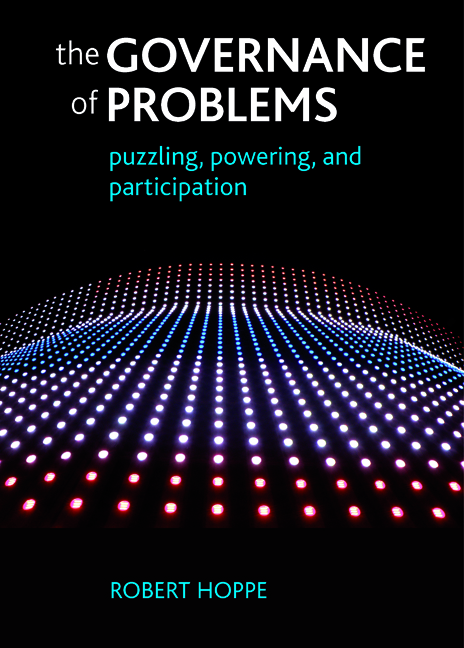Book contents
- Frontmatter
- Dedication
- Contents
- List of boxes, figures and tables
- About the author
- Preface
- one A problem-processing perspective on governance
- two The governance of problems: a map
- three Analysing policy problems: a problem-structuring approach
- four Cultures of public policy problems
- five Problem types and types of policy politics
- six Problem-structuring dynamics and meta-governance
- seven Making policy analysis doable and reflexive
- eight The plural democracies of problems: a meta-theory
- nine Public engagement and deliberative designs
- ten Responsible and hopeful governance of problems
- Bibliography
- Index
two - The governance of problems: a map
Published online by Cambridge University Press: 01 September 2022
- Frontmatter
- Dedication
- Contents
- List of boxes, figures and tables
- About the author
- Preface
- one A problem-processing perspective on governance
- two The governance of problems: a map
- three Analysing policy problems: a problem-structuring approach
- four Cultures of public policy problems
- five Problem types and types of policy politics
- six Problem-structuring dynamics and meta-governance
- seven Making policy analysis doable and reflexive
- eight The plural democracies of problems: a meta-theory
- nine Public engagement and deliberative designs
- ten Responsible and hopeful governance of problems
- Bibliography
- Index
Summary
Government organised around problems, not problems around Government. (Tony Blair, speech on civil service reform, 24 February, 2004)
Introduction
Much has already been written on responsive governance. This book brings together issues that are traditionally treated separately: the analysis of problems (puzzling), the politics of problem framing and network management (powering) and the politics of political participation. The conceptual ‘umbrella’ to be used for integrating these different themes is problem structuring. It is a powerful analytic concept, which manages to integrate a lot of political and policy science insights in an easily grasped way.
First, this chapter deals conceptually with the question: what is problem structuring? Second, using the development of the welfare state and, particularly, the events of ‘Paris 1968’ as historical illustrations, it will show the political relevance of problem structuring. The question underlying this part is: what do we know about how much influence citizens do actually exert on the structuring of public policy problems? The chapter ends with the articulation of research questions dealt with in the rest of the book; and with a conceptual map of the governance of problems, which explains the organisation of the book.
Problem structuring and responsive governance
Problem finding versus problem solving
What do I mean by problem structuring? First, problem structuring refers to the cognitive, puzzle aspect of processes of problematisation in politics and public policy. It emerges from an experience and reflection on the practical tension between problem finding and problem solving. Very generally, a problem is a gap between a current situation and a more desirable future one. Problem processing is usually considered to be about problem solving. It means that people start looking for ways of bridging or diminishing the gap between an ‘is’ and an ‘ought’. Problem solving assumes that people have consent on values at stake and have identified policy ends; thus, they can afford to focus attention on finding the most effective and efficient means. By applying those means, they develop expertise, a division of labour, collaboration, organisation and other coordination mechanisms.
Information
- Type
- Chapter
- Information
- The Governance of ProblemsPuzzling, Powering and Participation, pp. 23 - 58Publisher: Bristol University PressPrint publication year: 2010
